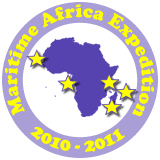
News: 14 Sep 2010, Nungwe | |
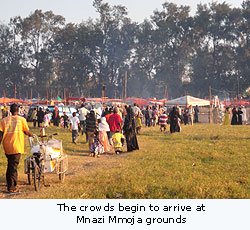 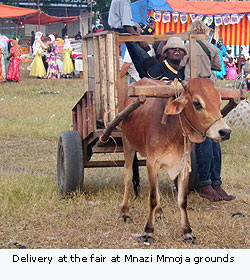 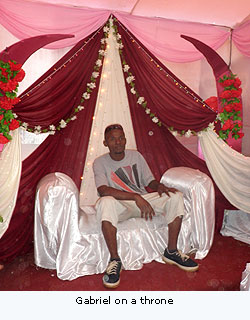 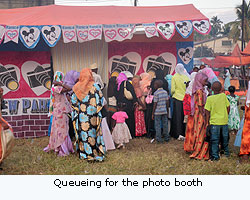 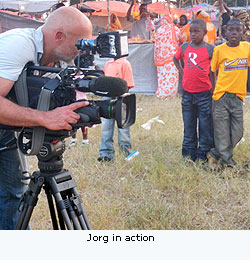   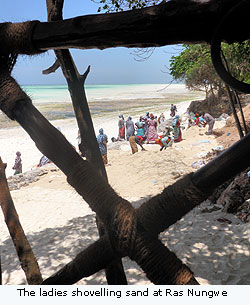 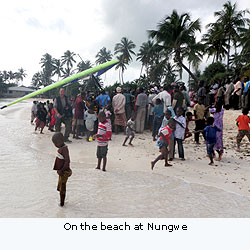 | I did that local flight around the Zanzibar circuit pretending the nosewheel wouldn't come down. Cedrick had a lesson so he couldn't do air to air, but we got shots of me hauling on the rope from the Go-Pros on the wing and I did a go-around at low level with the nosewheel going up and half down for the benefit of Jorg who was positioned next to the runway. Of course I didn't do it right so was told to do it again, and this time Cedrick was available, but by this time the traffic was so busy, including a couple of big airbuses taking Italian tourists home, that I was only permitted to fly a left hand circuit inland which ruined the whole point as I had to be seen to fly over the coastline, and I never got near to Cedrick, so this second flight was all a bit of a waste of time. Eve went back to Dar on the 9:30 Coastal flight. Things are still very busy with people coming and going to the EId El Fitr celebrations and this was the only seat she could get all day or she would have stayed until the evening to be back at work tomorrow. The crew didn't need me for most of the afternoon so I got my stuff out to do a couple of mods to the FIB, fit an extended range fuel system so I could get back from Pemba into wind, and install a wingtip camera mount. At the last minute they had a change of mind and I had to go back across town to the hotel with them to do an interview with greenery in the background to pretend we were at the end of the story on Chumbe island. A complete waste of time because what could I say? We've hardly started yet, why we couldn't we do this at the end of the journey when we really are on Chumbe island? Anyway, I made up some drivel and crew eventually satisfied, I was released to go back to my mods. I got the fuel system done, a simple arrangement with an electric pump to transfer fuel into the main tank from cans tied into the bottom of the boat. before I had a chance to start on the camera mount they called me to say they were sending a taxi, so I packed up. It took me to a ghastly estate of crumbling flats built by the East Germans back in the days when Tanzania really was a Revolutionary Democratic Socialist Republic under Julius Nyere. We were there to visit someone in a flat to see what it was like. It had been pre-arranged but just before I got they were told the people were away in the countryside for Eid, so nothing to do. With us was Gabriel, a chap Matthias had befriended in the street a couple of days before. It turned out his mother lived in the same flats, so we went into her place instead; six times in fact. Gabriel's mother was sitting on a sofa quietly reading aloud from a huge Koran across her knees. Initially it was a scene which made me feel a bit uncomfortable, especially when Jorg shoved the lens of his huge video camera almost into her face, several times. But she didn't seem to mind, and was very jolly once she'd finished her devotions. As it got dark we wandered over the road to Mnazi Mmoja grounds, a large grassy open space where they have a huge fair as part of the Eid El Fitr celebrations. There were thousands of people there with their children all dressed up in their best kit, and stalls selling all kinds of takeaway food, tacky chinese toys, camel and horse rides, altogether a very colourful scene. We wandered through the crowd, camera crew dashing around trying to get us without people in the backgroind complaining, until we reached a booth where people were queueing up to have family portraits taken against a choice of three rather tacky backdrops, a flowery one, a sort of greenery one, or a huge pink heart. Matthias and I were made to sit on a shiny silver sofa in front of the heart which was illuminated by flashing lights and comment on the success of the whole trip as the closing scene of the film. Apparently I said something appropriate, but it was diifficult, seeing as we're still more or less at the beginning. Up before breakfast again to go to Nungwe, a town at the northern tip of the Island where I would land on the sea. As there was still the possibility I might not be permitted to land outside an airport I had carefully prepared the correct codes to put in my flight plan for an out-of-airport landing, and wore my captain's stripes. I think I made the right impression, because the chap happily applied the official stamp when I handed my flight plan it to him. The second hurdle was the tower, I called: "Good morning Zanzibar tower, this is india eight three seven one, request taxi for a flight to Nungwe, two hours fuel, two persons on board, left turn out from runway 18 please". But would they let us go? After a short pause, permission was granted. We climbed out and turned left heading across the island to the east coast where we would turn north. It was quite rough, a couple of times I saw 1000 fpm up and 800 down, Matthias said something about roller coasters, we even got a splattering of rain, but it became very pleasant when we reached the sea. Flying up the coast along the spectacular reef it didn't take long to realize that there have been very big changes since I was here ten years ago. Then, there were a few scattered resorts along the coast, now they are practically cheek to cheek all the way. We'd stayed at Matemwe bungalows which was some basic but pleasant makuti bungalows in an idyllic location several miles from the next hotel. Now it is surrounded by other developments, I was quite shocked. Makuti is the sort of thatch they use here. It is an excellent 'prefabricated' roofing material made of palm leaves woven around a palm stem into panels about three feet wide and a foot deep and laid onto the rafters in about three inch steps, so at any point in the roof there are three or four thicknesses. It is a very popular material in lodges and hotels as it exudes the right kind of native effect, but it does burn well, so the locals, who usually cook on open charcoal braziers prefer corrugated iron, if they can afford it. In the distance, north from Matemwe I could see something huge at the end of the island. This was Nungwe's newest Italian hotel, not quite finished, with the biggest Makuti roof I've ever seen, it must be at least six stories tall, completely out of scale for the place, I thought it would make an excellent, and very huge bonfire. At Nungwe we were supposed to land on the sea front where all the dhows were moored, but as I descended to have a look it became really quite rough in the lee of all the town's tin roofs and palm trees. The tide was about half out and I thought there was also a risk of hitting a coral outcrop or something so I headed back past the lighthouse to land in the smoother air coming up the east coast where we'd just flown. I chose a large azure patch with a sandy bottom, landed smoothly and taxied onto the beach, I'm getting better at this. Matthias and I enjoyed a nice cup of coffee in the beach bar of the Ras Nungwe hotel waiting for the crew to arrive. A large group of local ladies were shovelling sand from the beach back behind a concrete barrier, they refused to let Matthias photoraph them. In the end we all stayed for lunch there. Thomas was a bit shocked when the bill came to $200, and none of us had more than a rather ordinary snack. It turns out I'd chosen to land next to a hotel which costs $900 a night, and it wasn't a very impressive place, rather mediocre in fact. I wondered how much it costs to stay at the Doubletree Hilton opposite where all the Dhows are moored. I went off to get fuel. There was a plan to do some flying for the cameras but on returning there was rather a fierce looking black cloud coming so I decided to derig the wing using Aimaro's cunning system for folding the wing without taking it off the FIB so it doesn't get full of sand. I had helped Aimaro do this at Trasimene but not done it myself yet, so I was a bit slow, and when I was about half way through the first strong gust hit. Suddenly I was in a race to save the thing from being destroyed. It started to hose down with rain, and then a particularly big gust caught us and the whole FIB started rolling along the beach. Film crew carried on filming with me yelling "hold the wingtips up!" We got to a stage where things were becoming quite desperate and I yelled at the crew to come and help, eventually they did, and we got the wing closed up and safe. A narrow escape, both of the special extendable tubes you use for this derigging scheme bent, but no damage to the machine. Nungwe is an extraordinary place. Along the beach you have hotel after hotel and immediately behind that you have the town. The difference is astonishing; $1000 a night one side of a wall, small tin roofed houses with no water supply the other. Yes, no water, the ladies of the town have to collect their water from a well and carry it home on their heads in plastic cans, apparently they did have water before the hotels started sucking it all out for their guest room power showers. The fishermen have nowhere to go any more and mend their nets in narrow canyons between high hotel walls. Apparently the hotels mostly do not employ local people because they are 'stupid' or they are offended by the nakedness of the tourists when they're on the beach, so people are brought in from the mainland and the local people benefit not a jot from this massive business on their doorstep where they've been for hundreds of years. There are even Masai who are employed as Ascaris (guards) to keep the riff-raff out, how incongruous is that? The most astonishing thing is how friendly they all are; Matteius wondered why they're not throwing stones at the tourists. I'm no social campaigner, but there is an injustice here and I wouldn't be surprised if one day all of these hotels suddenly burst into flames. In fact one did catch fire yesterday, probably an accident, and it quickly spread to the Makuti roofs of two adjoining hotels too, so everyone knows they burn really rather well. They looked a mess, even the trees around them were black as a cinder. My advice to the hoteliers of Nungwe is "Look - you will have a problem here, deal with it before it's too late." We left the FIB on the beach in the hands of a couple of Ascaris for the night. When I was told they were on the way, Thomas couldn't tell me whether they were Mascaris or Ascaris, it took me a moment to realize this is his contribution to Ki-Swahili and Mascaris are new name for Masai Ascaris, but when they arrived it was clear they were local men. The chief Ascari made me tie the FIB to a tree just in case there was an exceptionally high tide in the night. We stayed in Serena Bungalows, a quite low profile row of terraced rooms in the second row from the beach. Locally owned. Next morning we were up early to rig the FIB and fly it round to land close to the Dhows. High tide was at about 8:30, perfect. I don't think I can safely take off any time the other side of half tide here, too much risk of hitting something and ripping the bottom out of the FIB. Matteius and I went round to Ras Nungwe, rigged the machine, I double checked for storm damage, there was none, and had a fairly easy takeoff in two foot waves. The plan was to do lots of low passes in front of the Dhows for the cameras, land, fit the go-pros and do it again. I did my stuff and it couldn't have been better, whizzing along with the rudder in the water between the beach and the dhows. I could see from the way the dhows were all lying at anchor there was a weird wind condition where it was in completely opposite direction to the prevailing south easterly, something to do with the trees or the end of the island, so I changed my planned landing direction. While I was doing my circuits a very large crowd appeared from the village to watch this unusual spectacle. When we'd finally managed to signal to the film crew to a position where they could actually see us landing I made a smooth touch down and sped towards the beach, the throttle wouldn't close completely so I cut the engine but we still hit it rather fast. The FIB screeched to a halt on the sand, and then nearly tipped completely over on it's side before righting. We don't wear seatbelts when landing on water; as we tipped, Matteius completely fell out onto his back into the surf, clutching his camera in the air. The crowd roared, Matteius yelled "take my camera!", the film crew got the lot (I think), and Thomas rushed forwards and said to Matteius "did you see the Dolphins?!" Dolphins? I remembered, this flight is supposed to be at another time, but right now something quite dramatic is happening, and all he can think of is Dolphins? I was more interested in getting the wingtip out of the sea and Matteius was more interested in the immediate survival of his very expensive camera. When I was looking for the cause of the problem I found the hand throttle was a little bit on, I think my shorts must have caught it when we landed. We had survived without damage, but I'm still learning to drive this thing in the water... Some time later, Go-pros fitted, enormous crowd pushed back a sensible distance, I started the engine to do it all again. The tide was going out and we were a bit far up the beach, I'm sure it will be an amusing shot of Matteius and me bouncing up and down in the seats at full throttle trying to get it to slide down the sand. I'd advised Thomas not to fit his expensive Canon SLR to the bow as I thought it could get wet, which was just as well because hen we did get going 50 gallons of seatwater spashed over the bow as we moved off. Distracted by this, we were then caught by a strong gust of wind from completely the opposite direction as it had been all morning, the prevailing wind was taking over from the local effect behind the trees! Too late, the moored Dhows were beginning to swing at anchor, I had the downwind wingtip in the water, we would have been over had it been deeper than a foot or two, but the net result was we were driven back onto the beach whereupon another wave tipped 100 gallons of water over the transom together with a great mass of seaweed. I switched off the engine, the crowd helped me pull the FIB up onto the beach. Somehow in this manoevering a tip strut on the left wingtip got broken, I told them operations were over for the day until I'd repaired it. I'm still learning to drive this thing in the water... The film crew went off with Matteius to do some other stuff, I fixed the tip strut by over-sleeving it with a bit of aluminium pipe from one of my camera mounts, and lots of tape. This is a part which usually does nothing, but it's there to get you out of big trouble, and my repair is fine; it will get me out of trouble if necessary, but I must remember to order a new one. Having done this I found them with the Turtles. There's a lagoon near the lighthouse with a dozen or so green turtles in it, some really quite big, perhaps a metre across. It was rather entertaining watching Matteius sitting chest deep, being interviewed while the turtles casually cruised around in slow motion trying to find sneaky ways to bite a chunk out of him. Unfortunately I didn't get a shot of this as my camera wasn't working, but it was fine once I'd got home and washed the sand out of it under a tap. In the evening we had to do a entirely fabricated 'beach barbeque' scene. It took ages to arrange the lights, by the end of it the fish were cooked to death so we gave them to the children hanging around in the shadows. We're off to Pemba tomorrow, it's a 35 mile sea crossing followed by a similar distance to the place we're going at the most northerly tip. I'm told the owner is a Turk, but he sounded rather English to me when we spoke on the phone and gave me the coordinates to put in my GPS. Hopefully I've got the range, and there will be a tailwind, but if not I'll divert to Chake Chake airport which is about half way up the island. |
Home
8 Jul 2011, Video clips
28 Jun 2011, Message from the producer
17 June 2011, Postscript
27 Sep 2010, Dar again
23 Sep 2010, Chumbe
20 Sep 2010, Zanzibar again
18 Sep 2010, Bullfight
17 Sep 2010, Kervan Saray
16 Sep 2010, Pemba
14 Sep 2010, Nungwe
12 Sep 2010, Popobawa
11 Sep 2010, Zanzibar
9 Sep 2010, Teddy Junior
26 Aug 2010, Ursula
26 July 2010, Home
17 Jul 2010, Just in time
15 Jul 2010, No wind
13 Jul 2010, Mindelo again
11 Jul 2010, Grogue
9 Jul 2010, Ponta do Sol
7 Jul 2010, Goal
5 Jul 2010, Independence day
4 Jul 2010, Wind
2 Jul 2010, Mindelo
31 Jun 2010, SS Tarrafal
30 Jun 2010, Tarrafal
27 Jun 2010, Praia
23 Jun 2010, Sal
20 Jun 2010, Bonding in Munich
29 Apr 2010, Lake Trasimene
Mauritius
Wind
Cape Verde
20Kt wind probability
Zanzibar
Talks & Presentations
RMH pilot CV
